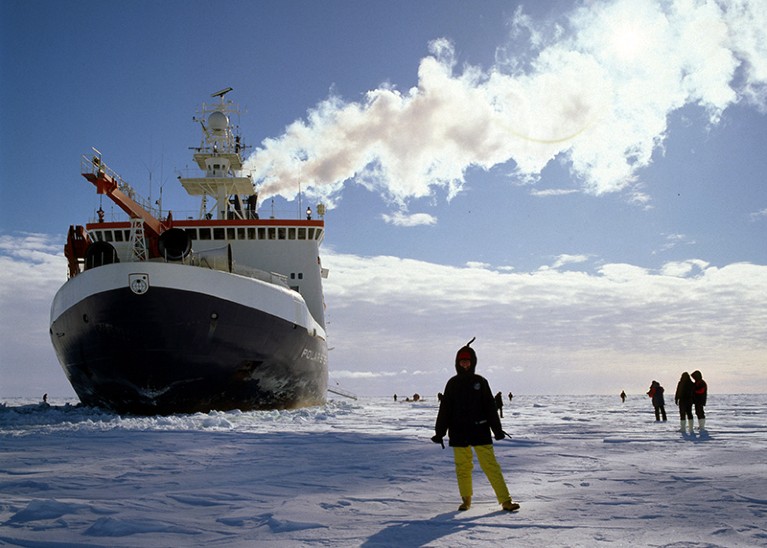Hello Nature readers, would you like to get this Briefing in your inbox free every day? Sign up here.

Icebreaker and research ship Polarstern, pictured here in the ice of the Weddell Sea, Antarctica, is set to explore an intriguing ecosystem.Credit: Picture Alliance/Photoshot
Antarctic voyage will explore ocean hidden for 100,000 years
In July 2017, a giant iceberg broke off from the Larsen C ice shelf east of the Antarctic Peninsula, revealing a large swathe of ocean that had lain in darkness beneath the ice for millennia. Now a 45-strong research team has set off aboard a German icebreaker to explore the newly exposed waters, in the hope that the sea bed might hold clues to the evolution and mobility of marine life and its response to climate change.
Trump’s science adviser wants industry to have a bigger role in funding research
Private funding of science is key to ushering in a “second golden era” of US science, according to newly minted US science adviser Kelvin Droegemeier. Droegemeier made the call during his first public address since taking office last month. He also emphasized the need to reduce unnecessary regulations and administration, but did not address climate change, environmental issues or other scientific topics that Trump has disparaged publicly.
Open peer review doesn’t put reviewers off
Posting peer reviews alongside published papers doesn’t dissuade potential reviewers, nor does it affect their recommendations about whether to accept the manuscript, according to a rare analysis. Some are concerned that the practice of ‘open peer review’ could compromise the peer-review process, but the analysis of more than 18,000 reviews from about 9,000 submissions seems to allay those fears — a result that surprised the study’s authors.
Reference: Nature Communications paper
Why hundreds of scientists formed a human chain around the Hungarian Academy of Sciences
Hungarian scientists are outraged by a government move to redirect money meant to fund operations at the nation’s science academy towards financing a government-led call for research proposals. The move effectively leaves scientists at the academy — which runs 15 independent research institutions and has more than 130 research groups in universities — competing against their own running costs. Hundreds of scientists and supporters turned out to protest against the decision, forming a human chain around the academy building as a gesture of protection.
FEATURES & OPINION
Both sides of the scalpel
In 2017, British actor and author Stephen Fry was diagnosed with prostate cancer after a routine medical examination. He went on to be successfully treated, a process that he and his surgeon recall in this unique jointly authored piece in Nature Reviews Urology.
Nature Reviews Urology | 23 min read
The confounding magnetic readings of Voyager 1
Space scientists thought that when the Voyager 1 spacecraft arrived in interstellar space, there’d be a telltale shift in the magnetic field. But six years after the craft became the first human-made object to enter interstellar space, we’re still waiting to see that shift.
Should a body of water be given rights normally granted to a person?
Residents in Toledo, Ohio, will be asked to vote on an unusual issue later this month: whether Lake Erie, the world’s 11th largest lake, has the legal right “to exist, flourish, and naturally evolve”. The lake system has encountered a number of environmental problems, from poisonous algal blooms and fertilizer-filled run-off to invasive fish species. If the lake wins legal rights, it means people might be able to sue polluters on its behalf.
